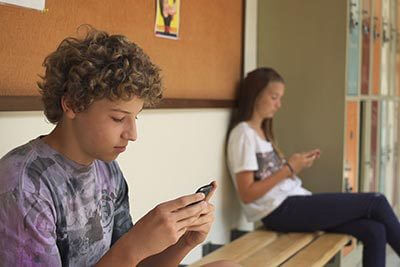November 30, 2017
 by Dr. Bill Hudson, Head of School
by Dr. Bill Hudson, Head of School
If I could, I would mandate that all parents attend the upcoming parent education night on Tuesday, December 12 at 6:30 PM. In partnership with the Parents Association, MPA is offering a showing of the acclaimed documentary, Screenagers, followed by a discussion facilitated by teachers and administrators. As an educator, I see firsthand the effects of social media, video games, and internet addiction and have grave concerns regarding their effect, developmentally, academically, socially, and mentally on the wellness and happiness of our children.
As a family, we struggle with finding the right balance between allowing our children to make decisions about their screen time and asserting ourselves with what we know, or think, is best for them. We have made a conscious decision against having internet access and television at our cabin. Mateo and Ari will complain all the way up but quickly, without them even noticing, find creative ways to spend their time once we are there. Up to this point, neither of them have a smartphone. However, Ari reminds me (almost daily) that she is the only sixth grader without one. I’m not so sure I believe her!
It is no surprise that screen time has dramatically increased over the last several years. For example, a recent survey found that screen time for children from zero to eight years old averages 48 minutes a day, and a third of that time in on mobile devices. The average time a teenager spends on a screen is nine hours a day, not including use for school or homework. The digital transformation of our homes, schools, and families brings both opportunities and challenges.
It is clear that the sharp rise in depression and anxiety among teens is tied to technology and social media use, as well as to the serious pressures faced by today’s teens. Through her research, psychologist Jean Twenge has discovered that eighth graders who spend six to nine hours a week on social media are 47 percent more likely to say they are unhappy than those who use social media less. She concludes, “The more time teens spend looking at screens, the more likely they are to report symptoms of depression.”
In addition to affecting the mental health of young people, use of social media is also rewiring their brains. Cognitive neuroscientist Lauren Sherman has found that teens change their behavior to get social approval. Viewing posts with a lot of likes on Instagram, Snapchat, Musical.ly, activates the reward system in our brains. It can also lower the viewer’s self-control and may lead teens to engage in drug or alcohol use.
Lest you conclude that I am a luddite, I do see technology as integral to modern life. However, I do believe that in order to be successful in helping our children navigate the present liminal state of smart machines, parents must be informed and empowered. I also believe that a strong partnership between school and home is crucial and we all need to be on same page.
From our founding, MPA has been a leader in the use of technology in support of learning. We are also very intentional in fostering digital citizenship. Together, with our character education program and focus on social-emotional learning, we strive to empower students to make good choices about their use of technology, form healthy relationships, and harness the power of technology to support academic achievement.
“There are two possible paths before us,” said authors John Palfrey and Urs Gasser. “One in which we destroy what is great about the Internet and about how young people use it, and one in which we make smart choices and head toward a bright future in a digital age…. On one of these paths, we seek to constrain their creativity, self-expression, and innovation in public and private spheres; on the other, we embrace these things while minimizing the dangers that come with the new era.”
I strongly urge you to join with other parents to view Screenagers on Tuesday, December 12 at 6:30 PM in the Nicholson Center. A discussion will follow facilitated by teachers and administrators with time to ask questions and share successes and challenges. Our school psychologist, Dr. Jules Nolan, will also be present. The partnership between our school and parents is a hallmark of an MPA education. By joining together, and drawing from our common values, we can better assist our children and transform challenges into opportunities for learning and growth. I look forward to seeing you on Tuesday, December 12.